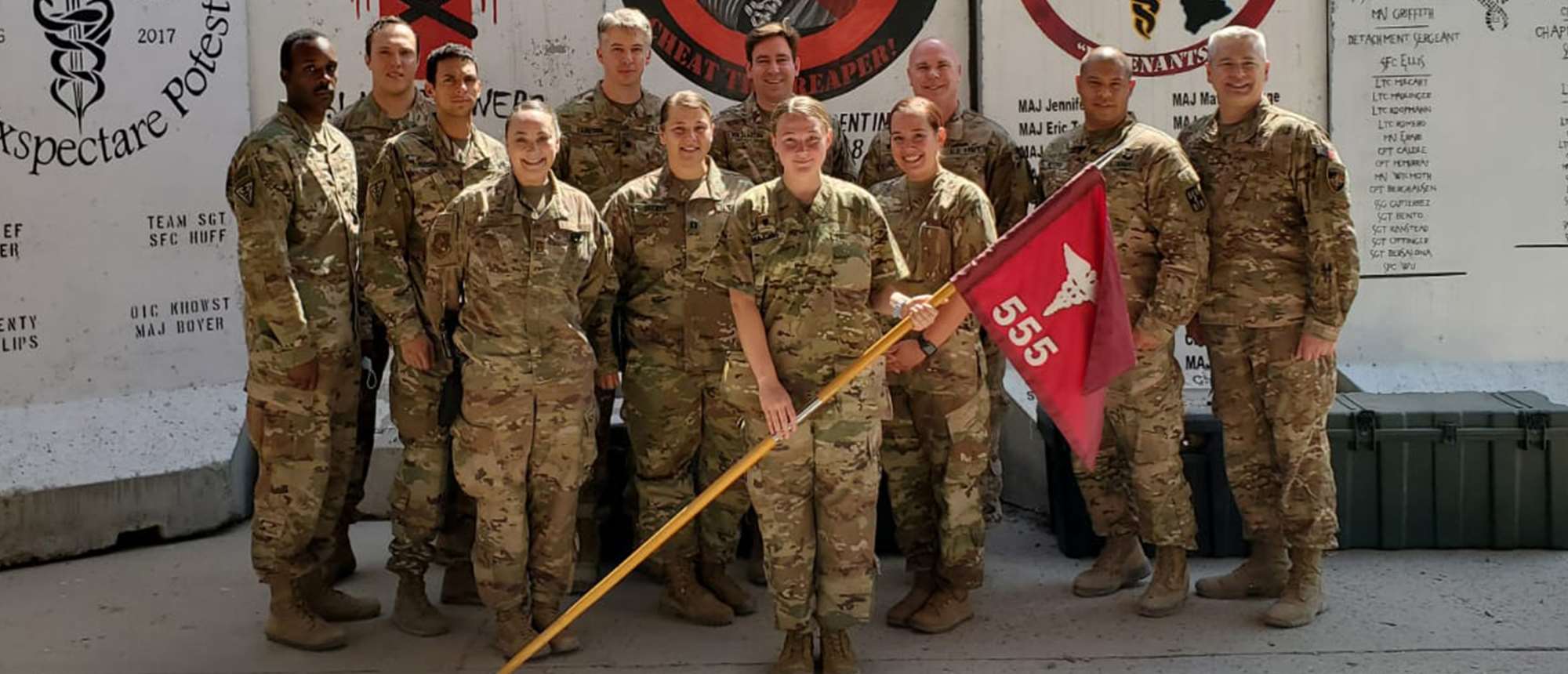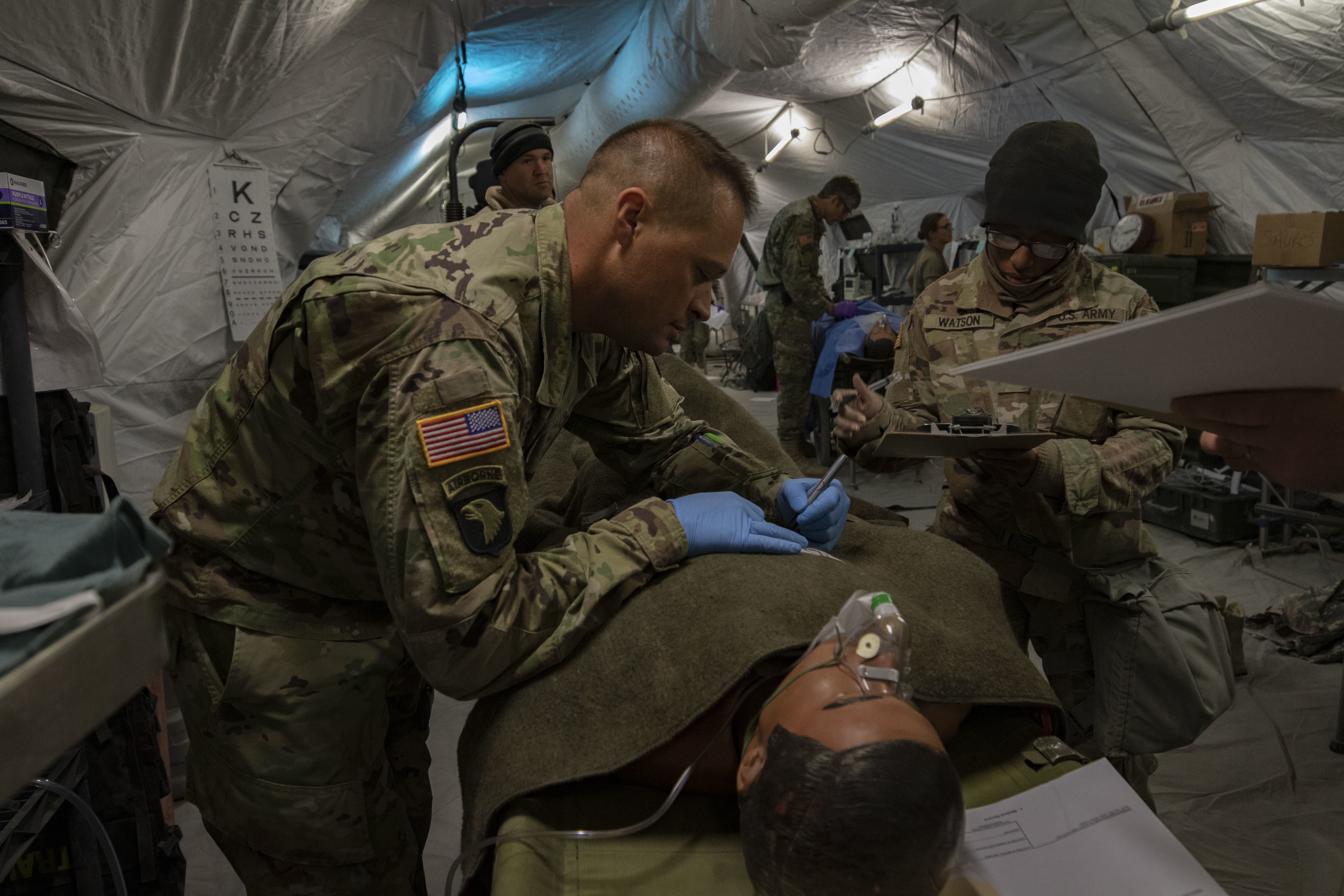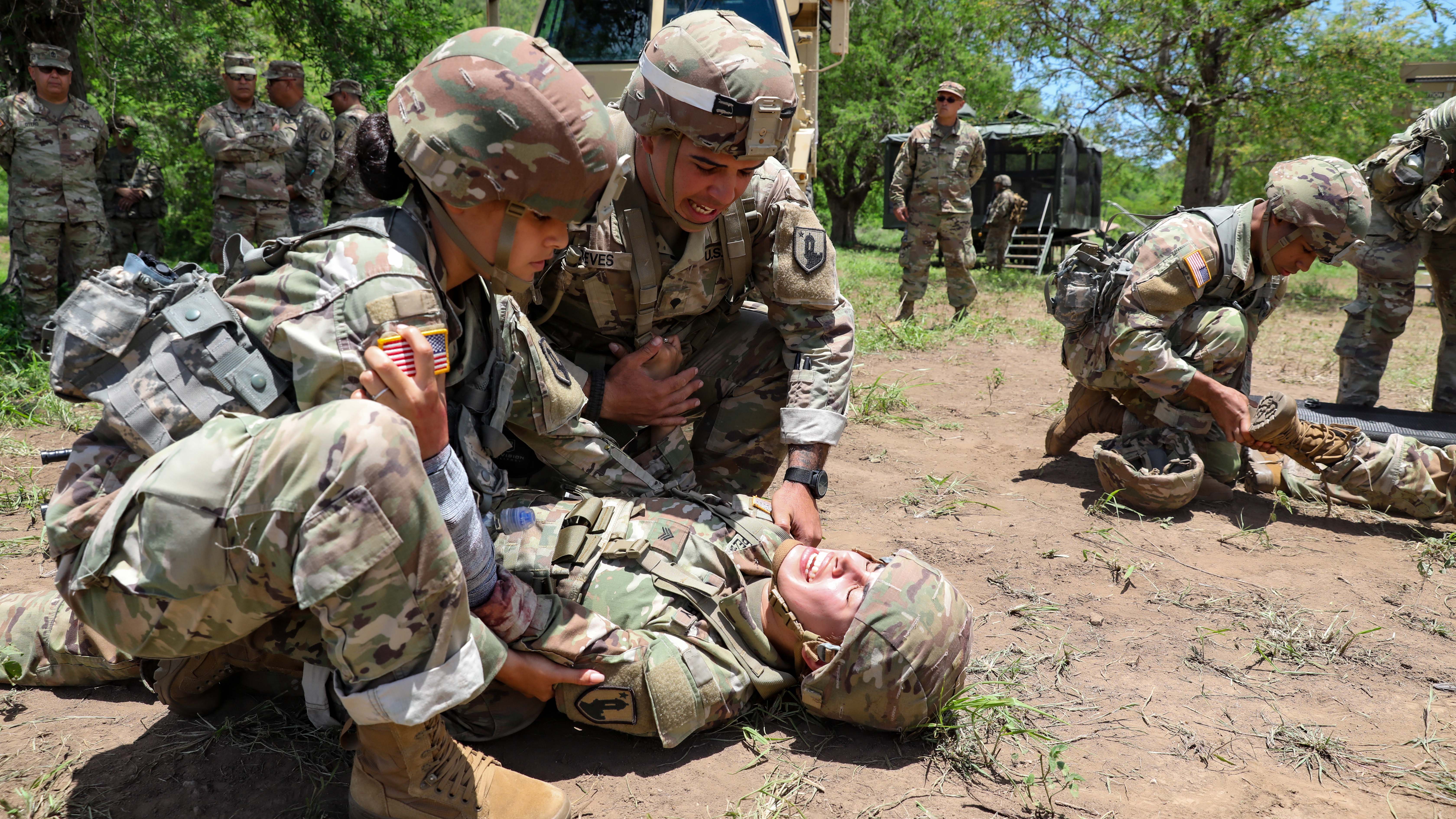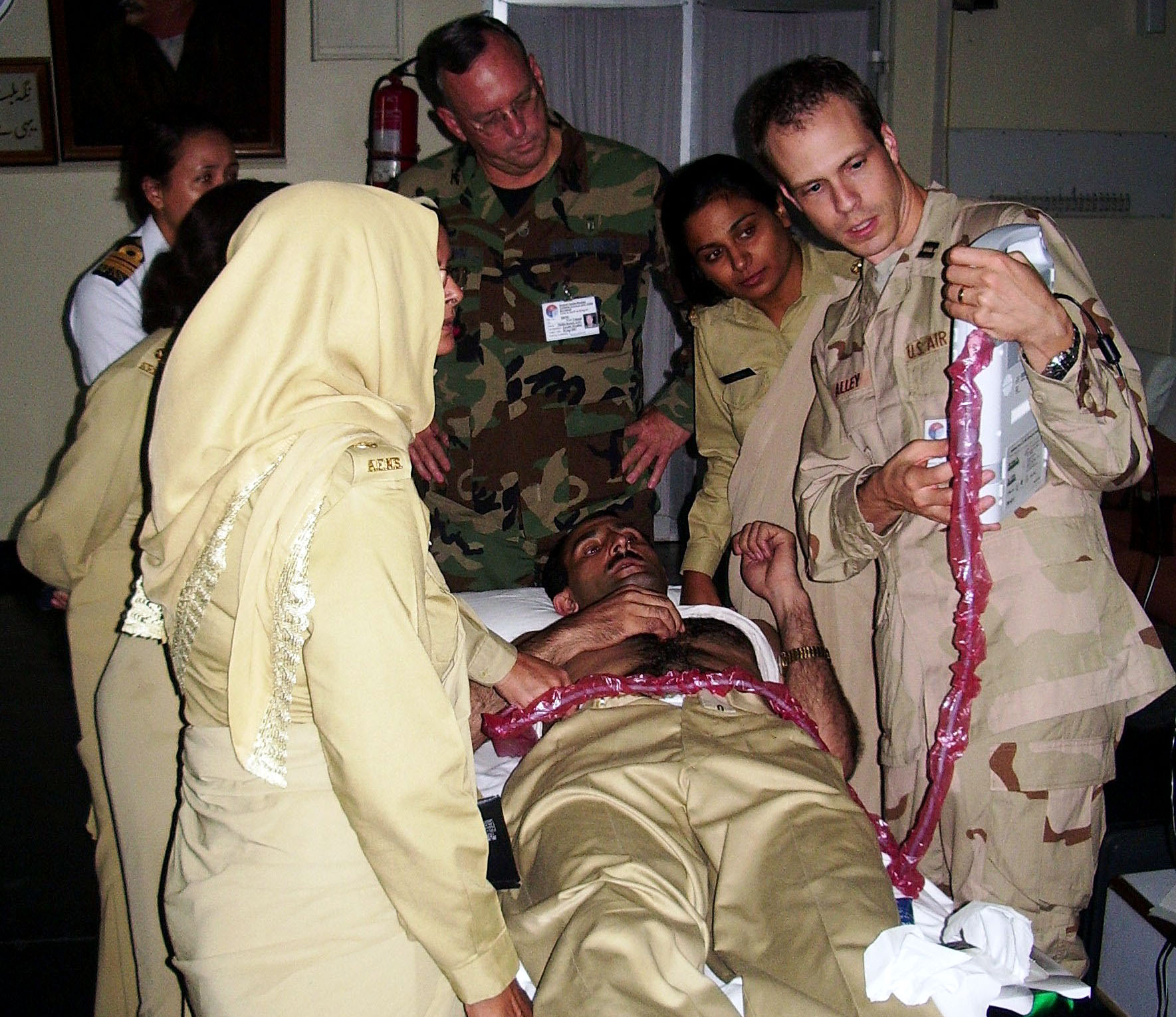Military Surgeon - 1/7 Show Title + Hide Caption - Lt. Col. Louis DiBernardo, U.S. Reserve Brigade Surgeon for the 11th Military Police Brigade, visits Soldiers during the annual combat exercise at Fort Hunter Liggett to provide real-world medical care . , Calif., Ju... (Photo credit: USA) View original
2/7 Show Show + Hide Caption - "We didn't go into military medicine for the money," says Lt. Col. Louis DiBernardo about choosing a career as a doctor. "We do this to be one with the other soldiers. We are still soldiers first... In the field you have that chimney... (Photo credit: USA) View original
Military Surgeon

3/7 Show Title + Hide Caption - Lt. Col. Louis DiBernardo, U.S. Reserve Brigade Surgeon for the 11th Military Police Brigade, walks with a senior officer in his area while conducting a medic rotation during combat support training. gives hands Exe ... (Photo credit: USA) View original
International Partnerships: Ukrainian Surgeons Visit Army Medicine In Europe
Show 4/7 Show + Hide Caption - US Reserve Brigade Surgeon Lt. Col. Luis DiBernardo for the 11th Military Police Brigade visits the 228th Combat Support Hospital while providing real-world medical care to warfighters during combat operations. Offers. Training ... (Photo credit: USA) View original
5/7 Show Title + Hide Caption - U.S. Reserve Brigade Lt. Col. Luis DiBernardo (right) for the 11th Military Police Brigade delivers medical equipment to the 228th Combat Support Hospital while providing real-world medical care to Soldiers. Gives. Annual training ... (Photo credit: USA) View original
6/7 Show Title + Hide Caption - U.S. Reserve Brigade Surgeon Lt. Col. Louis DiBernardo for the 11th Military Police Brigade briefs instructors on the actual medical conditions of Soldiers in the 91st Training Unit. Training exercises ... (Photo credit: USA) VIEW ORIGINAL
7/7 Show Post + Hide Caption - Lt. Col. Louis DiBernardo, U.S. Reserve Brigade Surgeon for the 11th Military Police Brigade, always carries a pair of trauma scissors in his uniform, which he says every soldier should have during have training Field environment during combing... (Photo credit: USA) Original view
Army Surgeon General Speaks At The Ausa Noon Report
Fort Hunter Liggett, California. - When on the field, he wears a kick clip attached to his shirt. The blue grips are against the faded green and brown camouflage of his uniform. They are easy to use in an emergency.
"Every soldier should carry it, whether you're in the medical field or not," said Lt. Col. Louis DiBernardo, a U.S. reserve medic, while training at Fort Hunter Liggett, Calif.
"You never know when you're going to have to expose a wounded area ... when that happens, we jump in as fast as we can," said DiBernardo, chief surgeon for the 11th Military Police Brigade. .

In the dry heat of Fort Hunter Liggett, DiBernardo Hospital was not comfortable for most civilian doctors. He was constantly in the field, working in a van or tent in 100 degree temperatures, responding to actual emergencies (tent collapses and car crashes), treating soldiers for routine medical needs, and supporting medical units.
Military Doctor's Experience On The Covid Frontlines In New York
"We're still soldiers first," DiBernardo said of himself and his medical staff. "Maybe you don't experience it in the hospital, but it's completely different in context because you experience breastfeeding. We wear the same clothes and we bleed the same color. When we get that white lab coat. It shows. A soldier is a soldier unlike any other soldier."
In his left front pocket (with his heart), Emma Di Bernardo carries everything to keep him going. Sealed inside a plastic Ziploc are several drawings of his two sons, Louis and John. The photos are from years ago when the boys were much younger. They are now 18 and 9 years old.
When he thinks about the role of his father and surgeon, he remembers the scene of the movie "We Were Soldiers".
How can you be a father and a soldier at the same time? "" he asked one soldier of another. "Well, I hope being good at one makes you good at the other." "I always find motivation in sentences like this."
Imcom Command Surgeon Receives National Military Service Physician Assistant Award > Joint Base San Antonio > News
He left the reserves in 2010 after completing his first 8-year contract. He was mobilized twice from 2004 to 2009 and sent to serve once every five years. He was born in Southern California and was sent to New York, Alaska and Iraq with his family.
"My son said, 'I want to be like my dad,' and I don't like that," she said.
As a practicing physician, DiBernardo has specialized in family work for nearly 20 years. When 9/11 happened, and he watched the Twin Towers fall, his first thought was, "I know they need a doctor."

Despite the warnings of his father, who had fought in Vietnam, and his grandfather, who served in World War II, he was taken prisoner.
Medical Exchange Program Benefits Military, Civilian Community > Air Force > Article Display
They all told me the same thing: don't join the army. Go to college and do what we can't do.
And so it happened. He was the first in his family to complete a 4-year degree and graduate from medical school. But when television footage showed the towers falling, the pull to the service was strong.
"I love taking care of soldiers. I see a lot of veterans in my clinic. A lot of young veterans. Amputees who come to the emergency room, and that talk helped me make up my mind. I miss him. .soldier." DiBernardo, who works at a clinic outside of Los Angeles.
Di Bernardo doesn't fit the common stereotype of the absent-minded doctor. He takes time to talk to his patients and soldiers.
How To Become A Military Doctor — Shemmassian Academic Consulting
"I admire Lt. Col. DiBernardo, he not only loves the Army, he loves being a brigade surgeon... He is always friendly with every patient he comes in contact with. Almost like this. He knows them on a personal level." Spc. Ryan Lowman, who assisted Col. from sunup to sundown in the California Combat Support Exercise, or CSTX.
Many patients who see DeBernard at his clinic ask if he has his own office. They want him to be the main Doctor. But he enjoys the shift because it allows him to balance time with his sons and continue his ministry.
As a brigade surgeon, he is responsible for the general medical training and medical care of approximately 3,000 soldiers in various divisions. If he is stationed in the military police, he will also take care of civilians and enemy prisoners in the detention centers of parliamentarians.
When he trained at Fort Hunter Liggett in July, he was always in demand. One minute he was changing a soldier's wound bandage, the next minute he was explaining to the medical staff in charge of the entire training area, then he was getting the supplies needed by the medical units through the training areas.
Vermont Deputy State Surgeon Receives Order Of Military Medical Merit > Vermont National Guard > Vt Guard News
During CSTX, he was asked to provide a medical report on progress in field medicine during training to the 91st Training Unit. This report will help better support soldiers in better preparation and prevent casualties.
An example: Military police units on the ground had the lowest heat loss rate of all troops at CSTX. Di Bernardo said this was due to a lack of medical attention among the deputies. This is something we would like to see him increase in all departments. In addition, DiBernado took it upon himself to conduct a Combat Lifesaver refresher course for his deputies at the beginning of their training. CLS provides immediate trauma care to soldiers who are not medical professionals when they are wounded or injured.
"There's a misconception that help arrives in seconds," DiBernardo said. This is why the lifesaving fight program is so important.
However, this extra work does not come with extra pay. That's fine with DiBernardo, who said he's not doing it for the money. In fact, he takes a pay cut to donate his spare clothes. Still, with scissors taped to his shirt and photos of his sons over his heart, DiBernardo is ready to serve wherever needed. The examples and views in this article may not reflect the universal view on the subject. . You can improve this article by discussing this topic

Post A Comment:
0 comments so far,add yours